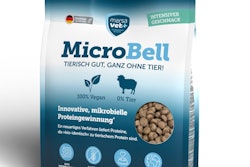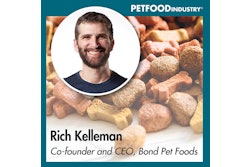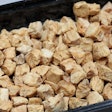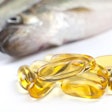
Calysta, a biotechnology company based in San Mateo, California, U.S., has sent its first shipment of FeedKind Pet protein, a non-GMO protein with no animal or plant ingredients used in its production, to its warehouse in Poland. FeedKind Pet is now available to pet food manufacturers across Europe, where it can be used in dry kibble, tinned food or treats.
According to Calysta, FeedKind protein is made using very little water and no agricultural land by fermenting low cost, land free carbon sources, to create a safe, nutritious, and traceable protein. Produced via a natural fermentation, it is non-GMO, has a complete amino acid profile and is highly digestible.
Made by fermentation, the protein was shipped by Calysseo, Calysta’s joint venture with Adisseo to produce FeedKind at commercial scale. Earlier this year, Calysseo received MARA approval from China for use in aquaculture feeds. An export permit granted this spring enabled Calysseo to commence shipping internationally. Calysseo said it hosts two of the largest fermenters in the world, each with a 10,000-tonne nameplate capacity.
“For the first time, Europe’s pet food sector has the option to choose a fermented protein that is nutritious and kind to the environment," said Herman Sloot, vice president of commercial development at Calysta. "Starting today, FeedKind Pet will be available globally at commercial scale.
“In the last decade, the number of pet-owning households has increased by approximately 20 million, with few indications it will slow any time soon," added Sloot. "There is a growing appetite for high-quality, animal-free protein in pet diets, and pet parents want ingredients that will benefit their pet’s health in the long run. FeedKind Pet uniquely meets that demand. It’s a win-win for both the pet sector and the consumer, offering optimal benefits for pets, owners, and the planet.”
Sloot added FeedKind already has GRAS status for use in aquaculture feeds and plans to extend this to pet food applications in the near future.
In May at Interzoo 2024, Trainee dog snacks were launched. The air-dried treats, made with fermented protein ingredient and introduced by Dr. Clauder’s, uses the FeedKind Pet protein, which offers a complete amino acid profile tailored for dogs and post-biotic properties that promote gut health.
Vegetarian protein source
FeedKind Pet said it brings to market the first high-quality fermented protein available to the industry in commercial quantities. It is vegetarian and at the same time nutrient dense, with a complete amino acid profile. It also contains postbiotic properties that help maintain a healthy gut in animals. Furthermore, even as a vegetarian protein source, it has excellent palatability and acceptance for both dogs and cats.
The first tonnes of FeedKind Pet were shipped from the Calysseo plant in China to Calysta’s EU GMP+ warehouse in Poland, and the first commercial deliveries to European petfood producers have now been completed. With Calysta’s patented fermenter based in Chongqing, China, this marks the first international exports by its joint venture with Adisseo.
FeedKind Pet is already approved for use in both the EU, the UK, Canada and other countries.
“Calysta and its partners have now established a robust international supply chain with global reach," said Alan Shaw, CEO and cofounder of Calysta. "FeedKind protein is the culmination of 10 years of hard work and brings a disruptive innovation to both the aquaculture and pet food industries at a scale that matters. We are making protein for feed and food with a small fraction of the resources required by traditional practices."














